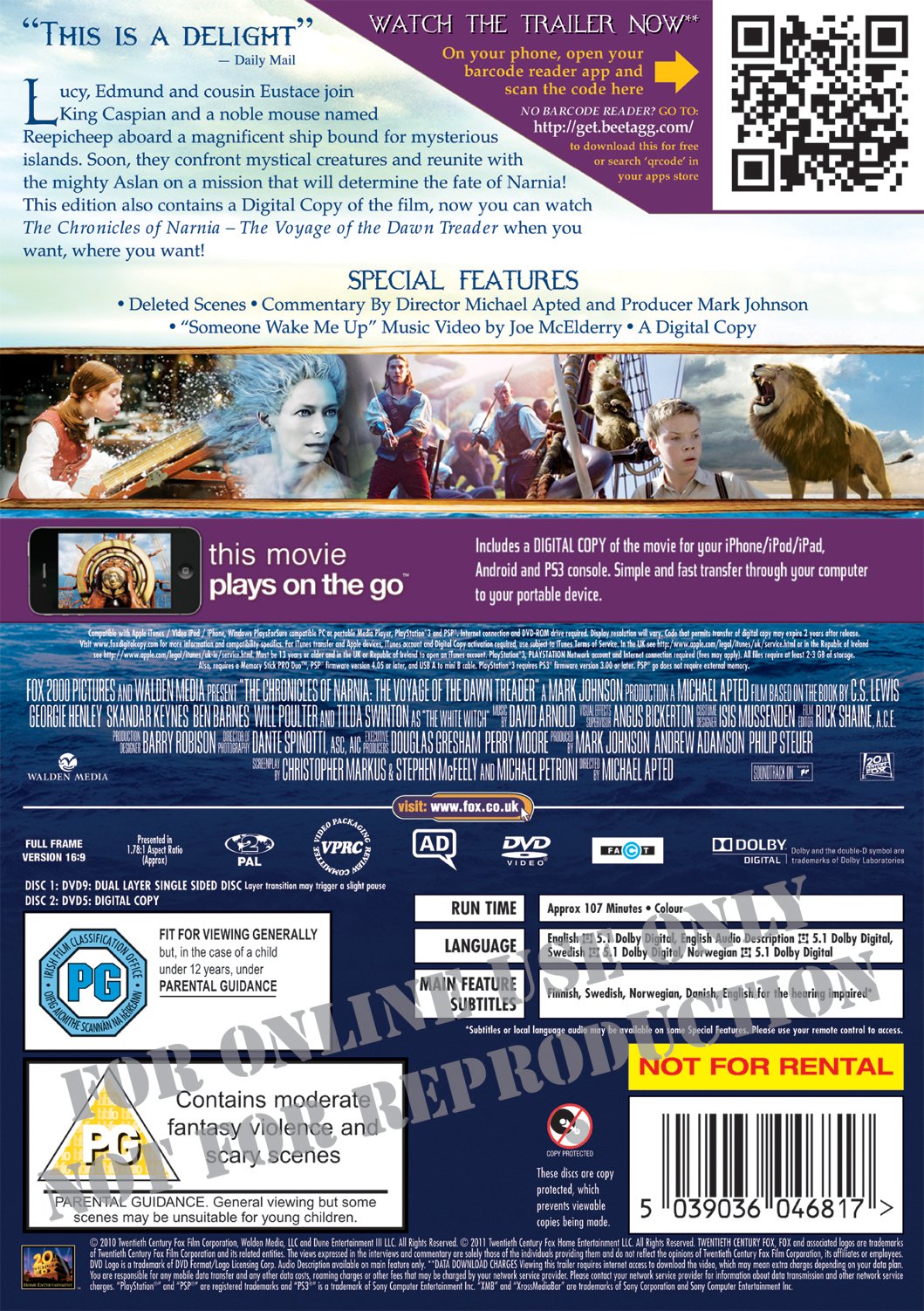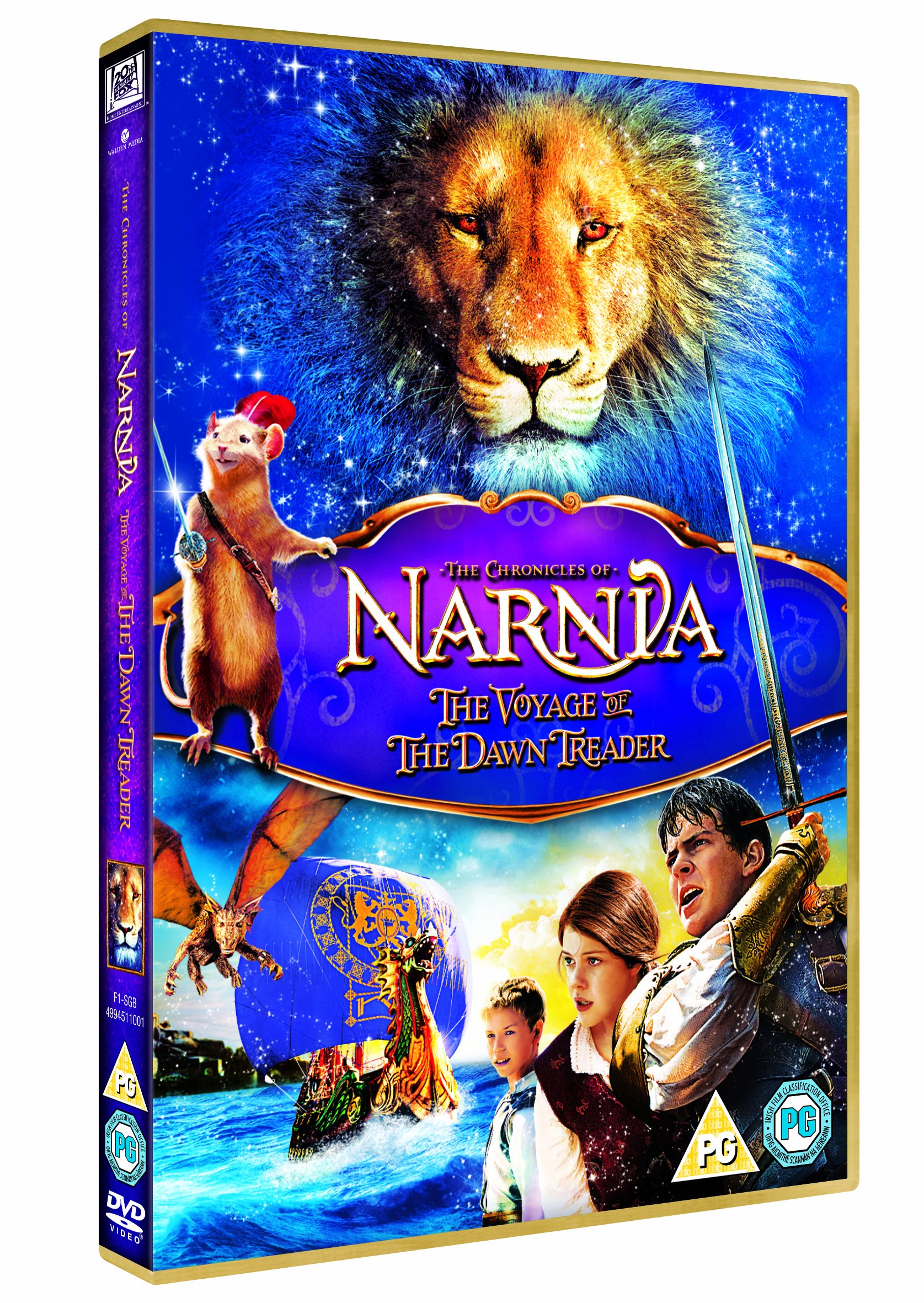![The Chronicles of Narnia: The Voyage of the Dawn Treader [DVD]](https://m.media-amazon.com/images/I/91av09ziCgL.jpg)



The Chronicles of Narnia: The Voyage of the Dawn Treader [DVD]
M**E
Goodbye Lucy and Edmund, until the end of time.
The Voyage of the Dawn Treader is by far and away the best of the three Chronicles of Narnia films.The artistry is superb and a number of scenes from the book have been imaginatively visualised to the viewer's great pleasure. Coriakin's island of the Dufflepuds and his mansion with the evening sunlight streaming through the hallway merit a special mention for evoking a haunting atmosphere. The soundtrack has memorable moments. In particular the score for the scene where Aslan `undragons' Eustace is both grave and moving; and conveys, in a way words never could, the majestic pity in the grace of this act of charity of the King of all Narnian Kings. Will Poulter is worth watching for his performance as the boy with the almost-deserved name. And there's the cameo role for Douglas Gresham (who is also the voice of the newsreader in the first film).However, all true Narnians will be sad that this is very likely the last of the big screen versions of these tales. This can be seen in the fact that the scriptwriters and producers have done a very clever job of incorporating significant stylistic elements from the other books into this film without altering the story too much.Narrowhaven, deserted in the evening light, is Charn under its red sun. Bells announce the arrival of danger, as the ringing of one does in The Magician's Nephew . The hall of the governor is modelled on Charn's hall of images. The `snakes' of green mist do the service of representing the green snake that kills Rilian's mother and, in human form, abducts him, in The Silver Chair (the mist `abducts' the Narrowhaveners). Eustace slashing with the sword at the enveloping `snakes' of green mist is Rillian fighting the Green witch-turned-serpent (and this scene serves as Eustace's reappearance to save Narnia, which occurs in The Silver Chair).The Green witch herself appears in the form of Tilda Swinton's green-tinted White witch. She dies when Edmund kills the sea serpent (a snake), in the same manner as the Green witch when Rillian attacks her with his sword. Ramandu's daughter is their guide, doing the service of Puddleglum who is the children's guide in The Silver Chair. She descends from the sky like the stars in The Last Battle. Lucy speaking the spell beautiful, and then waking, is Jill Pole in the castle of the giants when Aslan makes her see clearly, in a dream during a rainy night (there is a storm at sea), what she see ought to have seen (and Jill is given her own inclusion at the end of the film).The Calormenes and their defeat at the fight at Anvard get a mention in Caspian's summation of the state of Narnia. Gale is reminiscent of Aravis from The Horse and his Boy, who likewise leaves home for an adventure. Susan's liking for lipstick is given a graphic representation - and a reversal when she wants to go back to Narnia (it should have been because she is 'once a queen in Narnia, always a queen'). And the flooding of the bedroom, and by implication, Earth, at the beginning of the film is the flooding of Narnia in The Last Battle; both are the same apocalyptic image.So there we have it: five books in one film.If there should be a major criticism of the film it would have to be about its underlying ethos. Everyone knows that Lewis was a Christian and his stories are `about God'. Yet the alterations in the story that have been made to give the film a necessary flow of tension and relief suggest something else.Dark Island is described as a place of `pure evil'. It sits opposite Ramandu's Island, where Aslan's Table is located. This implies the existence of two equal and opposite powers competing for control of the world. This is dualism, something Lewis argued against. For Christian cinema-goers, the idea that darkness is in itself evil or is the symbol of evil is certainly not scriptural.The seven swords of Aslan (invented for this film, but perhaps inspired by the tree of protection that Aslan once plants) have to be aligned to release `healing' energy and put the world right. This is a typical motif of a philosophy called monism. Its religious derivative, pantheism, is something Lewis wrote strongly against. However if the seven swords are intended to be representative of the seven novels then that would be an appropriate tribute.There is another problem with the addition of the seven swords. Coriakin tells the travellers that they must lay the seven swords on Aslan's table on Ramandu's Island in order to destroy evil. He sent the six lords to do just that. However at that point in the film one sword has already been left behind on the Lone Islands and another on Goldwater Island. So the lords could never have fulfilled their mission. This illustrates the problem of scriptwriters trying to change and complicate the original plot of a book. What was obviously necessary for the film version was to make a visible and central evil opponent. This has been done by orchestrating the sea serpent and Dark island into a crescendo. The book lacks this as it is simply a journey (an illustration of the journey of faith).This inconsistency with the seven swords could never have been passed off in a book. This is because the reader has to constantly use his or her imagination as they read. That it can pass unobserved in a film shows how much the medium of film hoovers out the audience's imagination.Then there is confusion about where temptation comes from exactly. Does it come from the 'darkness within', as Coriakin says? Or does it come from outside, as Lucy says to Edmund and Caspian by the underground pool that turns everything to gold? The Gospel view of the source of temptation is the human heart (a person's conscience, will and affections). The book, illustrating the journey of faith, was in a strict sense about resisting temptation. The idea that there is light and dark within each person, and they only have to turn to the light, is an idea that begs the question that Lewis asked: What makes light so attractive? Why turn to the light when the dark can get you what you want equally well (as the pantheist Nikabrik turns with alacrity from Aslan to the servants of the White witch in the story of Prince Caspian)? The attraction to the light must come from without.After being `undragoned', Eustace says, "It wasn't all bad being a dragon. I think I was a better dragon than a boy". Why, then, be `undragoned' at all? His speech implies that a dragon is someone who has good and bad inside them, and all that is required is to turn them inside out like an old sock for them to be as right as rain. Whatever this idea is, it is not the Christian theology that Lewis wrote about. The spell that Lucy recites to make the unseen seen equates psychology, psychiatry and theology as acceptable means of making things visible. What can `enquiring within', the practice of the first two of these three things, reveal to you if out of the human heart come evil thoughts?The scene where Lucy uses the spell on board the ship to make herself beautiful has been illustrated in a striking way in this film. The change from the stormy weather to the complete calm of a sunlit morning is very evocative of Lucy's change of mood from disturbance to resolute action. But is it what Lewis really intended? Lucy does not 'doubt her value', a morally neutral act, but rather commits the sin of jealousy. Nor does her action in the book wish herself away. In the book Lucy becomes a Helen of Troy figure; the face that launched a thousand ships, and a war.All this may seem to weigh heavily against any possible enjoyment of the film. However, I think we can use one of Lewis' own metaphors here. All these things objected to above can be regarded as the wasps that buzz around while you are having a picnic in a beautiful part of the countryside. You needn't let them stop you having the picnic or enjoying the view.All true Narnians who will miss Lucy and Edmund until the end of time can certainly enjoy this film until that time when time does indeed end.
A**R
Narnia dvd
Classic story Narnia definitely reccomemd love these story's
I**Y
Better and better.
THE STORY:Edmund and Lucy are once more pulled into Narnia, this time with their obnoxious cousin Eustace. They find themselves reunited with Caspian aboard the Dawn Treader, a Narnian ship which is embarking on a journey into uncharted waters.WHAT'S GOOD:It is a sad fact that the childishness of 'The Lion, the Witch and the Wardrobe' put a large number of people off this series of movies, meaning that the much-better 'Prince Caspian' was not terribly successful, putting the entire franchise on shaky ground. I was delighted when this third movie finally got made and to my surprise found it leaps and bounds better than the the last (and therefore in an entirely different league to the first). Where the first two movies tried to tell the epic tale of the battle for control of a world and struggled due to ill-favoured comparison to 'The Lord of the Rings', this film is a pure adventure movie taking us to new, exciting and (occasionally) terrifying places. There is also humour in abundance and I genuinely laughed out loud in the Dufflepud scenes ("What manner of creatures are you?" "Big ones! With the head of a tiger and the body of... a different tiger!") All of the main characters are portrayed excellently by their respective actors but extra credit should go to Will Poulter who manages to thoroughly pull-off Eustace's dramatic character development. It's also worth mentioning that Simon Pegg ably takes up where Eddie Izzard left off with Reepicheep (who could so easily have become another Jar Jar Binks).WHAT'S BAD:Lewis purists will certainly bemoan the changes made to the story as told in the book but I can't claim to be among them. In fact the reduction of the religious allegory (in this case the Seven Deadly Sins) will probably make the film more palatable to some. For me, the only truly bad thing about this film was the diabolically saccharine song which plays over the end credits. We're talking an 'Enterprise'-titles level of vomit-inducing cheesiness here!
D**Y
Very good.
Narnia given the Hollywood treatment with a good cast, English thank god and spectacular effects, very enjoyable.Dogberry.
J**O
Quick delivery
Movie as ordered
Trustpilot
2 weeks ago
2 months ago